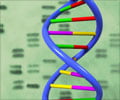Study says testing of DNA from a statewide blood screening program for newborns in Wisconsin was able to identify infants with T-cell lymphopenia
A study in the December 9 issue of JAMA says that the testing of DNA from a statewide blood screening program for newborns in Wisconsin was able to identify infants with T-cell lymphopenia, a blood disorder that affects the child's immune system, a disease in which early identification is important.
Infants with severe T-cell lymphopenia (abnormally low level of white blood cells), including severe combined immunodeficiency (SCID), often appear normal at birth and have no family history of immunodeficiency. "Consequently, many infants with severe T-cell deficiencies are not identified until life-threatening infections occur. This is an important issue because the long-term prognosis of infants with SCID and other serious immunodeficiencies is markedly improved if the diagnosis is made early, before the onset of serious infections," the authors write. They add that the administration of some vaccines that are recommended in early infancy can cause serious infection in infants with T-cell lymphopenia, which could be avoided with early detection.John M. Routes, M.D., of the Medical College of Wisconsin and Children's Research Institute, Milwaukee, and colleagues conducted a study to examine if determining the number of T-cell receptor excision circles (TRECs) using DNA extracted from dried blood spots on newborn blood screening (NBS) cards could detect T-cell lymphopenia in newborn infants in a statewide screening program. Between January 1 and December 31, 2008, the Wisconsin State Laboratory of Hygiene screened all infants born in Wisconsin for T-cell lymphopenia by quantitating the number of TRECs contained in a portion of the NBS card, with the cut-off number being TREC values of less than 25/μL. T-cell lymphopenia was confirmed by further testing.
During the study period, 71,000 infants were screened by the TREC assay. Seventeen infants of at least 37 weeks' gestation had at least one abnormal TREC assay, 11 of whom had samples analyzed to enumerate T cells. Eight infants demonstrated T-cell lymphopenia, who were then evaluated by a clinical immunologist.
The researchers suggest that these results provide support for state screening programs for severe T-cell lymphopenia, with the incidence of primary and secondary immunodeficiencies identified by the TREC assay exceeding the required incidence of disease to institute screening, and the TREC assay being relatively inexpensive (approximately $5.50 per assay). "Based on an analysis of potential cost-effectiveness of NBS for SCID, the relatively high incidence of T-cell lymphopenia and the low cost of the TREC assay suggest NBS may be cost-effective as well, although a formal cost-effectiveness analysis is needed."
"In conclusion, the Wisconsin screening program demonstrates the feasibility of the TREC assay performed on NBS cards to identify infants with primary and secondary forms of T-cell lymphopenia."
Advertisement
RAS














